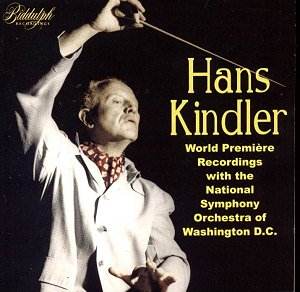AVAILABILITY
www.biddulphrecordings.com
One of the more obscure corners of the discography
is happily collated in this intriguing collection from Biddulph.
Collectors will know Hans Kindler primarily, I suppose, as a cellist
and one who gave recitals with Rachmaninov and Ravel and concertos
with Monteux and Furtwängler. He was the principal cellist
in Stokowski’s Philadelphia Orchestra in its early days but once
the First War was over he resumed his solo career, making a number
of sides for Victor. Like Barbirolli slightly before him the cellist
was soon to turn conductor and by 1931 he had formed the National
Symphony Orchestra in Washington and in 1940 they began to record.
The major fruits were the third symphonies of Brahms and Tchaikovsky
– fine, important recordings. But they also recorded lighter fare
and that is what we’re given here in what is I believe their first
silver disc appearance.
I think it’s clear that Kindler based his orchestral
sonorities and expressive nuances on Stokowski’s Philadelphians.
The repertoire here is also not so very far way from that propounded
by the more famous conductor and orchestra. The Frescobaldi is
stirring and resonant, the strings full and rich in full romanticised
fashion, akin to Stoky’s Bach (it matters not that it’s not by
Frescobaldi at all but by Kindler’s fellow cellist, the Catalan
Cassado). The Dutch Tunes could well be bracketed with say Respighi’s
Ancient Airs and Dances but they were just as likely to have been
influenced by Stokowski’s Two Ancient Liturgical Melodies – but
I love the contrast between he generates between full orchestral
power and the ripieno section in the first of the Tunes. The Handel
is probably better known in its Elgarian Overture guise but gets
a spirited, rather different and successful reading here. As a
twentieth century counterblast there’s Weinberger’s delightful
Czech Rhapsody – graceful, vibrant,
perky, with brassy horns and Dvořákian Slavonic dance motifs.
It gets a snorter of a performance; great fun. The Mussorgsky
bathes in the sonorous Washington strings and the Chadwick is
derived from the four Symphonic Sketches. Kindler evokes the nativity
affection of it, the glad warmth and sensitivity. Dai-Keong Lee
was born in Honolulu in 1915 and when this recording was made,
he was in the army. Stern, colourful, rhythmically vivacious it’s
also slightly spiced with degrees of exotica – to that extent
it plays the same role in Kindler’s orchestral life that, say,
Harl Macdonald did in Stokowski’s. Mary Howe’s Stars is a memorable
piece of evocative impressionism, beautifully played, and we end
with Schuman’s Academic Festival Overture. This is a high-spirited
romp, pungent and with some internal contrasts, a lusty fugato
and drum tattoos. This is its world premiere recording.
The excellent notes are by Stokowski authority
Edward Johnson and Mark Obert-Thorn provides further quality in
matters of transfer. This is a fine and well-timed celebration
of the musical life of a now unjustly forgotten musician.
Jonathan Woolf

